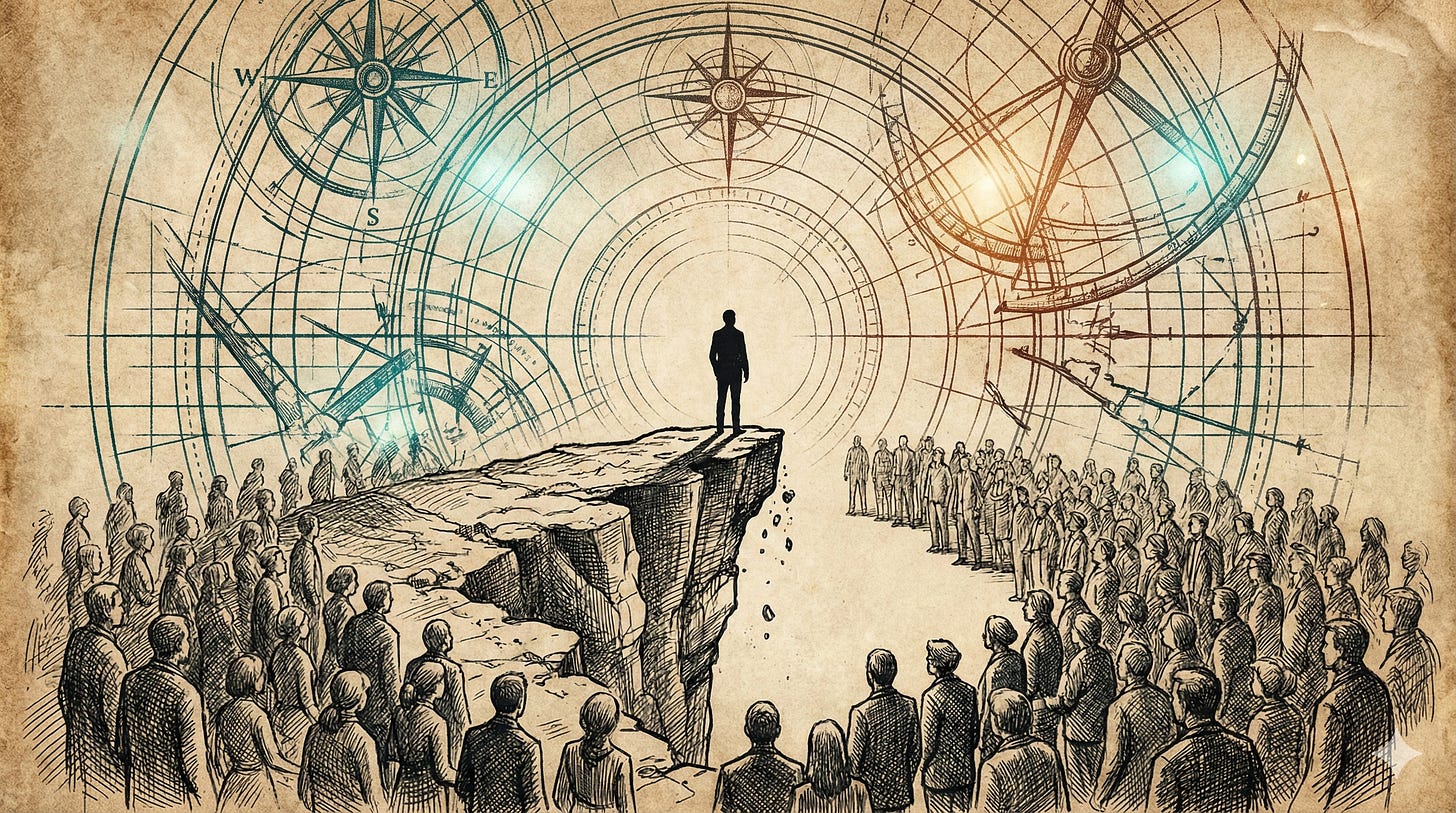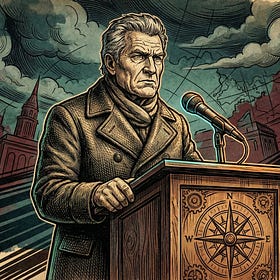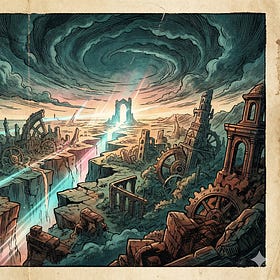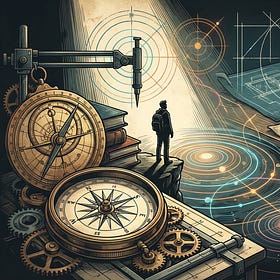You’re an Ignorant Fool—The Law of Tragic Nuance
Being a Radical Centrist between hype and doom in the AI Debate Means Fighting Everyone. Here's Why Nuance Still Matters.
I Argue with Everyone. Both Sides Hate Me. Here's Why I Keep Going.
The thing about being a radical centrist, between AI hype and doom, is that you get into twice as many fights as everyone else. AI leadership about taking the middle road.
As a writer trying to navigate between AI hype and doom with a nuanced, I face a unique challenge: Nuance is a terrible marketing tactic. It is hard to get anyone's attention in a world full of soundbites and clickbait.
Welcome to The Law of Tragic Nuance:
The more information you have, the more your perspective drifts to the complex middle, from where you must defend yourself against simplistic hot takes flying in from all directions.
Meanwhile, the loudest voices get the spotlight:
"No, AI will cure all diseases!"
"LLMs are plagiarism machines!"
"No, they herald a new age of creativity!"
"AGI is already here!"
"Nonsense. Try again in 30 years."
Why Simple AI Takes Win (And Nuance Gets Punished)
Here's what you're up against when you try to be the voice of reason in a world of nonsense:
Cognitive Ease: Human brains like shortcuts. Simpler = easier to digest = more likely to go viral.
Availability Heuristic: The spicier the take, the easier to remember. Nuance is for therapists.
Sensationalism: Clicks, baby. Clicks! The media doesn't care if it's wrong, just if it's loud.
Polarization: Say something nuanced and all your friends suspect you're with the enemy.
False Balance: "Let's hear both sides!" As if climate scientists and flat earthers deserve equal airtime.
Dunning-Kruger: The less you know, the more you bluster. Ignorance is loud; wisdom just mumbles.
Law of Small Numbers: People extrapolate entire imaginary worlds from just a few data points.
Confirmation Bias: Once someone believes in nonsense, they'll filter reality to protect it.
And yes, I'm guilty of these too. I'm human—flawed, biased, easily distracted by shiny things. But I do read books and articles. Lots of them. I try. Which is more than I can say for the people screaming on LinkedIn about AGI being either the messiah or the antichrist. At the very least, I try not to be an ignorant fool.
The Radical Centrist (aka The Loser in the Middle)
I call myself a radical centrist, preferring to stick to the nuanced middle while voicing my opinion as forcefully as I can. This gets me into more trouble than I care for. The people on the left see me as someone on the right, while those on the right see it vice versa. The thing about being a radical centrist is that you get into twice as many fights as everyone else.
On AI and Creativity
I argue with creatives who insist that AIs are just plagiarism machines. They're not. It's true that these tools enable humans to plagiarize more easily—yes, that's a legitimate concern. But the AIs themselves don't memorize copyrighted works like some kind of neural kleptomaniac. They don't stash PDFs under their digital mattresses. They generate content statistically, not by sneakily photocopying someone's novel or remixing Beyoncé's lyrics. They're not artists stealing; they're algorithms guessing.
At the same time, I argue with technologists and futurists who are too busy sprinting toward the singularity to realize they might be lighting their own creative funeral pyre. When humans outsource their creative work to machines, we risk collective deskilling. People forget how to draw, compose, design, or write because the machines do it "better." But when nobody's practicing the craft anymore, what fresh data will feed the next generation of AIs? What will the machines train on when human creativity has atrophied into lazy prompting?
On Power and Work
I argue with people claiming traditional corporations are tightening their grip, exploiting surveillance tools and algorithmic management to rule over workers like digital pharaohs. Sure, the execs have more data than ever on their employees' daily lives. But the balance of power isn't tilting endlessly toward the top. It's leaking out the sides—through freelancers, digital nomads, startups, DAOs, and the endless churn of gig work. The empire of hierarchy is being eaten alive by a thousand entrepreneurial termites.
The empire of hierarchy is being eaten alive by a thousand entrepreneurial termites.
Meanwhile, I argue with gig economy fanboys and techno-libertarians who think independence is freedom. The supposedly autonomous contractor—augmented by a swarm of AI tools—is often just as entangled in dependency as their cubicle-bound cousin. Everyone is caught in the same tightening mesh of economic precarity, platform monopolies, and algorithmic manipulation. The rebels may wear hoodies, but they're still chained to the machine. The gig economy isn't always freedom—it's sometimes just unprotected serfdom with better UX and no worker rights.
On AI's Impact
I argue with the AI doomsayers who see nothing but existential risk and social collapse. In reality, AI has already shown its worth for individuals seeking mental clarity, focus, and therapeutic support. The ability to reduce cognitive overload, juggle context-switches, and automate the relentless grind of daily drudgery is not nothing. Sometimes it's the one thing standing between someone and a breakdown.
But then I turn around and argue with the AI hypers—the productivity evangelists shouting that AI will make everything ten times faster with one-tenth of the team. Maybe so, but what's the hidden cost? Junior roles vanish. Mentorship collapses. The remaining workers bear the burden of unreasonable velocity. Burnout becomes the default operating system. What's the point of getting there faster if everyone's broken when they arrive?
This is the Law of Tragic Nuance in action: the more informed you are, the more you drift toward the uncomfortable, inconvenient middle—where you must constantly defend your position against fanatics, zealots, fearmongers, and alarmists flinging hot takes from all sides. Some days, it's stimulating. Some days, it's soul-sucking. And some days, the only appropriate response is: "You're an ignorant fool. Bye."
Or maybe I just like arguing with everyone.
It's starting to feel like a calling.
I’m a seasoned founder, intrapreneur, and former CIO who builds maps and models for Solo Chiefs navigating sole accountability in the age of AI—informed by plenty of scar tissue. All posts are free, always. Paying supporters keep it that way (and get a full-color PDF of Human Robot Agent plus other monthly extras as a thank-you)—for just one café latte per month. Subscribe or upgrade.
Occam's Razor and the Limits of Simplicity
Now, let's not throw simplicity under the bus entirely. Occam's Razor still matters:
"When faced with two competing theories, the simpler explanation is to be preferred."
Was philosopher William of Ockham wrong when he recommended that we search for explanations "with the smallest possible set of elements"? Are the writers, speakers, and thought leaders at the extreme ends of the opinion spectrum wiser than I am, with their simplistic theories that don't do justice to nuance?
Not really.
The same principle warns against oversimplification:
"Instances of using Occam's razor to justify belief in less complex and more simple theories have been criticized as using the razor inappropriately."
In other words, use the razor with care—don't shave your brain off.
In the words of Immanuel Kant:
"The variety of beings should not rashly be diminished."
And Albert Einstein:
"Everything should be made as simple as possible, but not simpler."
And finally, H.L. Mencken:
"For every complex problem, there is an answer that is clear, simple, and wrong."
So yes—start with more data. Then simplify, but not to the point of stupidity. Explain complex systems in digestible ways without flattening them into cartoon caricatures.
Why Nuanced AI Takes Don't Go Viral
And here's the problem for us writers: nuance doesn't sell.
Ask any politician.
"It depends" is a terrible soundbite. "It's more complex than you think" doesn't work as clickbait. "There is this web of trade-offs" doesn't inspire many TED Talks. The Law of Tragic Nuance says that those of us with an appreciation for the complexity of reality have a hard time capturing people's attention. Nobody is interested in the inconvenient truth. It takes too much effort.
Take vibe coding as an example. If I shout, "Vibe coding will get you 1000x dev speed!" I get plenty of comments and shares. If I claim, "Vibe coding will trigger an application apocalypse!" I might get even more.
What I actually want to say is:
"Use vibe coding for fast prototyping of disposable apps, but stick to traditional engineering for anything that needs long-term quality."
But I can already see people's eyes glaze over, their minds wandering elsewhere, their dopamine level craving a more interesting message. Most people won't even make it to the end of that sentence. Today's attention spans are shorter than the lifecycle of President Trump's import tariffs.
Welcome to My World
This is the curse of The Law of Tragic Nuance. The better you understand something, the harder it is to explain it in a way anyone wants to hear. And by the time you do, people have moved on to debating whether Elon Musk is a villain or a hero.
But here I am. Writing anyway. Arguing anyway. Swimming upstream with a grin and a keyboard.
Welcome to The Maverick Mapmaker.
Because some of us still believe in messy truths over viral nonsense. And because occasionally, when patience runs out, there's only one thing left to say:
"You're an ignorant fool. Bye."
Jurgen, Solo Chief
P.S. Where are you on the scale between hype and doom?
LLMs Are Like Politicians—Confidently Wrong
Politicians Lie. LLMs Bullshit. Here's How I Survive Both.
Don't Panic!—The AI Job Apocalypse Is Coming (But Humans Will Always Have Work)
Two billion years ago, a new technology emerged that killed almost everything on Earth—and created the conditions for a sprawling new ecosystem of biological innovation.
Fluent in AI or Clueless About People?
Shopify's CEO Told Everyone to Use AI. He Forgot to Ask How They Feel.






"We live in an open system world, subject to radical uncertainty" Abby Innes
Love the attempt at click bait with the word "tragic", right smack in the middle! Take that left and right!
What I am missing here is the concept of uncertainty. Not uncertainty in terms of "fear", but rather in terms of "adaptiveness". No extreme view is adaptive because it refuses to take on the seeds of the opposing (or merely differing) views.
Maybe the next iteration of the article will include the "uncertainty" idea?
Love the Law of Tragic Nuance. I think this radical centrist idea will also be useful in building skills to manage paradoxes. As you say, being in the center is difficult!!